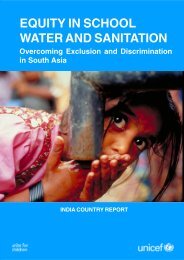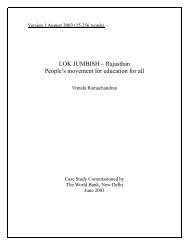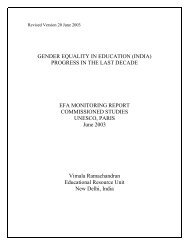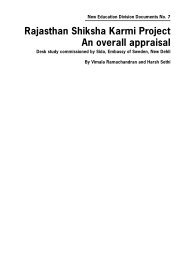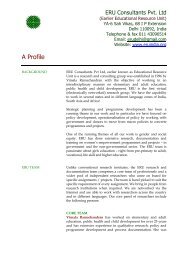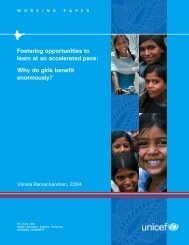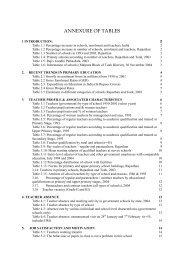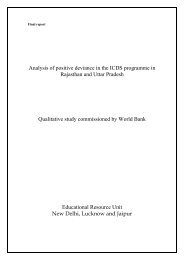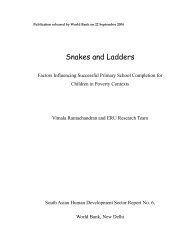primary school teachers the twists and turns of everyday practice
primary school teachers the twists and turns of everyday practice
primary school teachers the twists and turns of everyday practice
You also want an ePaper? Increase the reach of your titles
YUMPU automatically turns print PDFs into web optimized ePapers that Google loves.
Version 20 Oct 08, edited final<br />
questions <strong>and</strong> this dem<strong>and</strong>s greater preparation from <strong>the</strong> teacher. Many activities go<br />
beyond <strong>the</strong> physical boundaries <strong>of</strong> <strong>the</strong> class, as for example, in <strong>the</strong> case <strong>of</strong> EVS<br />
teaching. Children also refer increasingly to materials o<strong>the</strong>r than <strong>the</strong> textbook, which<br />
is seen as just one possible source <strong>of</strong> information. They also consult <strong>the</strong>ir parents<br />
who sometimes feel that <strong>the</strong>y are not learning much as a result!<br />
For <strong>teachers</strong>, <strong>the</strong>se changes imply that <strong>the</strong>y are expected to have more ‘outside<br />
knowledge’ (meaning <strong>the</strong>y are expected to know more than what is contained in <strong>the</strong><br />
textbook) <strong>and</strong> must be prepared to answer any questions that will come <strong>the</strong>ir way.<br />
Listening to <strong>the</strong> conversation one teacher said s<strong>of</strong>tly, ’There is no leisure for us, only<br />
pressure!’ The <strong>teachers</strong> burst out laughing as <strong>the</strong> teacher explained fur<strong>the</strong>r: ‘These<br />
changes are good, but are not effective—as yet. Children are still not learning well;<br />
<strong>the</strong>ir h<strong>and</strong>writing is not good now; <strong>the</strong>ir language has ‘deteriorated’; <strong>and</strong> <strong>the</strong>ir<br />
spellings are bad. We are not giving importance to vocabulary <strong>and</strong> grammar.’<br />
Discussions with smaller groups <strong>of</strong> <strong>teachers</strong> <strong>and</strong> teacher educators revealed that <strong>the</strong><br />
winds <strong>of</strong> change started blowing during <strong>the</strong> DPEP days. Participatory training was<br />
introduced <strong>and</strong> <strong>teachers</strong> were actively engaged in exploring alternative ways <strong>of</strong><br />
organising <strong>the</strong> classroom <strong>and</strong> interacting with children. But this momentum could<br />
not be sustained. With <strong>the</strong> coming <strong>of</strong> SSA, <strong>the</strong>y said, things have deteriorated.<br />
Training programmes are now designed at a higher level. In <strong>the</strong> training we<br />
observed, for example, that <strong>the</strong> focus was on NCF 2005. The document was divided<br />
among a number <strong>of</strong> <strong>teachers</strong> who read <strong>and</strong> discussed it in <strong>the</strong> training programme.<br />
There were a lot <strong>of</strong> big words <strong>and</strong> big ideas—<strong>and</strong> <strong>the</strong> <strong>teachers</strong> who read <strong>and</strong><br />
explained <strong>the</strong>m did so mechanically. An effort was made to enable many <strong>teachers</strong> to<br />
act as resource persons so that <strong>the</strong> honorarium available for lectures was divided<br />
among a larger pool <strong>of</strong> <strong>teachers</strong>.<br />
The message that came out loud <strong>and</strong> clear was that <strong>the</strong> energy seen between 1995-96<br />
<strong>and</strong> 2001 is not visible now <strong>and</strong> that <strong>the</strong> state has actually moved backwards. The<br />
resource persons (<strong>teachers</strong>) are ‘not resourceful’ <strong>and</strong> <strong>the</strong> didactic mode <strong>of</strong> training is<br />
back. It is somewhat strange that district <strong>and</strong> state level administrators feel that <strong>the</strong>re<br />
is a shortage <strong>of</strong> trainers <strong>and</strong>, <strong>the</strong>refore, practicing <strong>teachers</strong> double up as trainers <strong>and</strong><br />
temporary resource persons. Apparently <strong>teachers</strong> do not accept <strong>the</strong>m as <strong>the</strong>y did in<br />
<strong>the</strong> past. There is obviously a deeper current, which may be related to <strong>the</strong> waning <strong>of</strong><br />
a people’s science movement or <strong>the</strong> growing trend to opt for English medium<br />
<strong>school</strong>s leading to <strong>the</strong> rapid expansion <strong>of</strong> private <strong>school</strong>s.<br />
KSSP has always had a positive relationship with <strong>teachers</strong> <strong>and</strong> feels that <strong>teachers</strong> have always been<br />
central to <strong>the</strong> reform agenda in Kerala. However, KSSP is on <strong>the</strong> wane in <strong>the</strong> state at this moment.<br />
They (KSSP) did useful work between 1962 <strong>and</strong> <strong>the</strong> 1990s. Teachers, who once formed <strong>the</strong><br />
backbone <strong>of</strong> KSSP, are not joining it as in <strong>the</strong> past. Their membership has come down quite a bit<br />
over <strong>the</strong> years. Politically too, <strong>the</strong> KSSP ideology is not welcomed by <strong>the</strong> left or <strong>the</strong> right. The left<br />
party itself has changed much over <strong>the</strong> years <strong>and</strong> today, <strong>the</strong>y are very much open to private<br />
investments, which were ana<strong>the</strong>ma in <strong>the</strong> 1970s <strong>and</strong> 1980s (interview with late Pr<strong>of</strong>essor<br />
Gopinathan Nair, CDS Triv<strong>and</strong>rum, May 2008)<br />
Box 5.1: The role <strong>of</strong> KSSP in Kerala’s Educational Experience<br />
KSSP began in 1962 as an organisation for <strong>the</strong> popularisation <strong>of</strong> science led by <strong>teachers</strong>.<br />
In 1980-81 KSSP undertook an assessment (with GoI funding) <strong>of</strong> basic skills (3 Rs)<br />
which revealed that <strong>the</strong> ‘literacy status among even Class 5 children was alarming.<br />
Many <strong>of</strong> <strong>the</strong>m could not read!’ This was an eye-opener for KSSP <strong>and</strong> <strong>the</strong> government<br />
53



